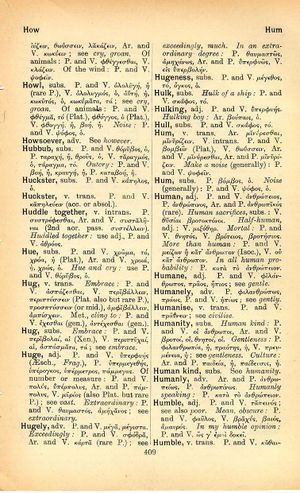humane: Difference between revisions
From LSJ
Michael Apostolius Paroemiographus, Paroemiae
(6_7) |
(D_4) |
||
| Line 5: | Line 5: | ||
{{Lewis | {{Lewis | ||
|lshtext=<b>hūmānē</b>: adv., v. [[humanus]]. | |lshtext=<b>hūmānē</b>: adv., v. [[humanus]]. | ||
}} | |||
{{Gaffiot | |||
|gf=<b>hūmānē</b>¹³ ([[humanus]]),<br /><b>1</b> conformément à la nature humaine : [[aliquid]] ferre Cic. Tusc. 2, 65, supporter qqch. avec résignation, philosophiquement, cf. Cic. Tusc. 3, 34 || humainement : Ter. Ad. 145<br /><b>2</b> à la façon d’un homme bien élevé : fecit [[humane]] Cic. Att. 12, 44, 1, c’[[est]] fort aimable à lui || avec bienveillance : Cic. Q. 3, 1, 20<br /><b>3</b> [ironie] agréablement, joliment : Hor. Ep. 2, 2, 70 || -nius Cic. Tusc. 3, 64 ; -nissime Cic. Q. 3, 1, 20. | |||
}} | }} | ||
Revision as of 06:44, 14 August 2017
English > Greek (Woodhouse)
adj.
P. and V. φιλάνθρωπος, πρᾶος, ἤπιος; see gentle.
Latin > English (Lewis & Short)
hūmānē: adv., v. humanus.
Latin > French (Gaffiot 2016)
hūmānē¹³ (humanus),
1 conformément à la nature humaine : aliquid ferre Cic. Tusc. 2, 65, supporter qqch. avec résignation, philosophiquement, cf. Cic. Tusc. 3, 34

